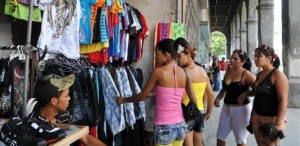 A stone’s throw from the corner of Galiano and Reina streets, huddle some twenty movable stalls. After nine on the morning, Rodobaldo, a tall and lanky man from Guantanamo without a permit to live in Havana, opens his junk shop where he sells T-shirts for 7 convertible pesos, girls’ sandals for five, and Nike tennis shoes for 45, “they’re authentic” he says.
A stone’s throw from the corner of Galiano and Reina streets, huddle some twenty movable stalls. After nine on the morning, Rodobaldo, a tall and lanky man from Guantanamo without a permit to live in Havana, opens his junk shop where he sells T-shirts for 7 convertible pesos, girls’ sandals for five, and Nike tennis shoes for 45, “they’re authentic” he says.
By noon there are so many people they knock into each other like the bumper cars at a fair. From one stall someone shouts, “Buy your panties here, they’re the latest fashion.”
In another timbiriche — a local term for these micro-enterprises — a fat mulatto unhurriedly eats bread with a little fish, fanning himself with the Granma newspaper. When he sees some customer approaching, he tries his best Colgate smile, and shows off a wide variety of trinkets.
In a doorway a guy who looked like a gambler, openly played the list of the “the little ball” — the clandestine lottery. We call him René. His wife sells jeans, socks, and low cut tennis shoes that she buys in bulk from people who make a living moving goods from Ecuador, Venezuela or Miami.
“Sales in this area of Central Havana are usually very good,” says René. “Yeah, there are a lot of shops. But we offer the best and the cheapest of this stuff. I dedicated myself to the game, but I was a born loser. With the money I put together I buy large quantities of clothing from some friends who frequently travel to Ecuador and bring back tons of textiles and costume jewelry. It’s not going badly. And of course I play the lottery,” René reports while taking a good swallow of white rum.
When you walk through Havana you notice how the ambulatory stores are dispersed. Selling anything. Religious objects. Pirated discs. Or clothes and shoes.
Whether in Central Havana, Mantilla, Marianao or Vibora, at any central point, you see a rolling wardrobe full of cheap goods. According to Marlen, a bleary-eyed mulatto, the business pays enough for breakfast, lunch and dinner.
“It’s not a fire sale or anything like that, but I get by. On a bad day I look to earn between 15 and 20 convertible pesos. This from 9 am for ten hours, sitting on this wooden bench,” says Marlen.
The legal self-employed can’t escape the fiscal blade.
In October of 2010, General Raul Castro, overwhelmed by an economy going down the tubes, productivity in the basement, and inflated payrolls, without much bureaucratic rigor or controls, authorized 178 private professions, which later increased to 181. It’s what it is.
